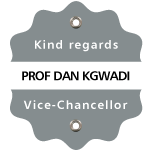Message from the
Vice-chancellor

dear colleague,
By the time you read this, Easter will be behind us and the season will have turned. It is once again time for assessments, followed by first semester exams three weeks later. Simultaneously our marketers are busy visiting schools and arranging open days to recruit future students for the 2019 intake.
This represents the dynamism that the NWU promises: always forward-looking, planning and envisioning future success. In this issue of Eish! you will read about our hopes of securing state support for the establishment of a new medical school. You are also able to read about all the renovations and building projects on our campuses.
However, our focus at the NWU remains on our people and our desire to promote an ethic of care at the university. Our staff and students represent the core of our identity and we want all of them to feel welcome, engaged and included on all our campuses. So, as always, you will read about our exceptional students and staff.
During the past months we experienced a challenge when first-year students who were not certain about the implications of the new funding arrangements announced late last year, descended on us. NSFAS, as a result, had its own challenges, that spilt over to the NWU. We had to make many on-the-spot decisions regarding registration. I salute the staff on our campuses for dealing with this in a caring, responsible way.
Our language policy and plan task team continues to receive input into the revision of our new Language Policy and Plan. Thank you for all of your input so far.
I am frequently asked for my personal views on this matter. Our policy and plan needs to comply with the requirements of the Language Policy for Higher Education which prescribes a functionally multilingual environment, as well as our 2017 Statute. Our Statute states that the language policy of the university “must be flexible and functional, and must redress language imbalances of the past and promote multilingualism, access, integration and a sense of belonging”.
If we are led by these imperatives, we will avoid the divisive, polarising approaches that detract from the need to achieve education transformation and integration of groups through the use of different languages.
